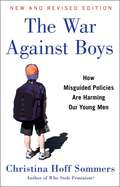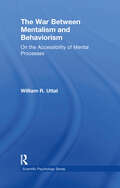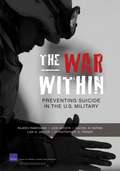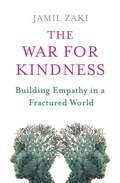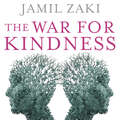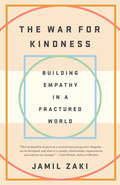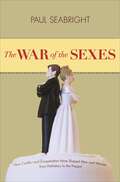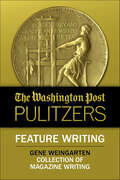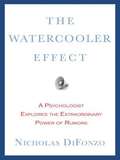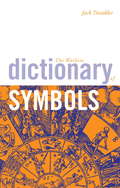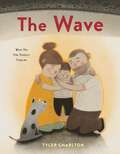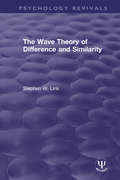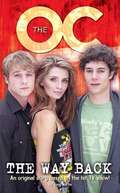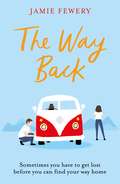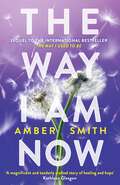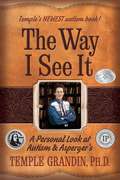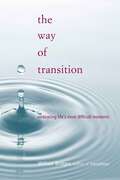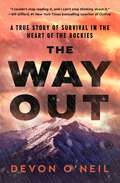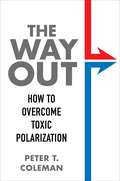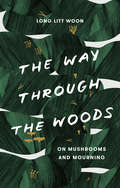- Table View
- List View
The War Against Boys: How Misguided Policies are Harming Our Young Men
by Christina Hoff SommersAn updated and revised edition of the controversial classic—now more relevant than ever—argues that boys are the ones languishing socially and academically, resulting in staggering social and economic costs.Girls and women were once second-class citizens in the nation&’s schools. Americans responded with concerted efforts to give girls and women the attention and assistance that was long overdue. Now, after two major waves of feminism and decades of policy reform, women have made massive strides in education. Today they outperform men in nearly every measure of social, academic, and vocational well-being. Christina Hoff Sommers contends that it&’s time to take a hard look at present-day realities and recognize that boys need help. Called &“provocative and controversial...impassioned and articulate&” (The Christian Science Monitor), this edition of The War Against Boys offers a new preface and six radically revised chapters, plus updates on the current status of boys throughout the book. Sommers argues that the problem of male underachievement is persistent and worsening. Among the new topics Sommers tackles: how the war against boys is harming our economic future, and how boy-averse trends such as the decline of recess and zero-tolerance disciplinary policies have turned our schools into hostile environments for boys. As our schools become more feelings-centered, risk-averse, competition-free, and sedentary, they move further and further from the characteristic needs of boys. She offers realistic, achievable solutions to these problems that include boy-friendly pedagogy, character and vocational education, and the choice of single-sex classrooms. The War Against Boys is an incisive, rigorous, and heartfelt argument in favor of recognizing and confronting a new reality: boys are languishing in education and the price of continued neglect is economically and socially prohibitive.
The War Between Mentalism and Behaviorism: On the Accessibility of Mental Processes (Scientific Psychology Series)
by William R. UttalThis book considers one of the most fundamental, but only infrequently considered, issues in psychology--Are mental processes accessible by means of verbal reports and/or experimental assays? It is argues that this is the main characteristic distinguishing between behaviorism and mentalistic cognitivism. The answer posed by the author is that, with few exceptions and for the most fundamental reasons, mental processes are not accessible and that any psychology, such as contemporary cognitivism, based on a putative analysis of mind into its mental components must be fallacious. Classic and modern arguments against both mentalism and behaviorism are reviewed. In general, it is concluded that most antibehaviorist arguments are based on second order humanistic considerations rather than those underlying the usual scientific standards. Behaviorism represents the best that can be done in a situation of fundamental immeasurability and uncertainty. A modern version is offered in the final chapter of this book.
The War Complex: World War II in Our Time
by Marianna TorgovnickThe recent dedication of the World War II memorial and the sixtieth anniversary commemoration of D-Day remind us of the hold that World War II still has over America's sense of itself. But the selective process of memory has radically shaped our picture of the conflict. Why else, for instance, was a 1995 Smithsonian exhibition on Hiroshima that was to include photographs of the first atomic bomb victims, along with their testimonials, considered so controversial? And why do we so readily remember the civilian bombings of Britain but not those of Dresden, Hamburg, and Tokyo? Marianna Torgovnick argues that we have lived, since the end of World War II, under the power of a war complex--a set of repressed ideas and impulses that stems from our unresolved attitudes toward the technological acceleration of mass death. This complex has led to gaps and hesitations in public discourse about atrocities committed during the war itself. And it remains an enduring wartime consciousness, one most recently animated on September 11, 2001. Showing how different events from World War II became prominent in American cultural memory while others go forgotten or remain hidden in plain sight, "The War Complex" moves deftly from war films and historical works to television specials and popular magazines to define the image and influence of World War II in our time. Torgovnick also explores the 1961 trial of Adolf Eichmann, the emotional legacy of the Holocaust, and the treatment of World War II's missing history by writers such as W. G. Sebald to reveal the unease we feel at our dependence on those who hold the power of total war. Thinking anew, then, about how we account for war to each other andourselves, Torgovnick ultimately, and movingly, shows how these anxieties and fears have prepared us to think about 9/11 and our current war in Iraq.
The War Inside
by Michal ShapiraThe War Inside is a groundbreaking history of the contribution of British psychoanalysis to the making of social democracy, childhood, and the family during World War II and the postwar reconstruction. Psychoanalysts informed understandings not only of individuals, but also of broader political questions. By asserting a link between a real 'war outside' and an emotional 'war inside', psychoanalysts contributed to an increased state responsibility for citizens' mental health. They made understanding children and the mother-child relationship key to the successful creation of a democratic citizenry. Using rich archival sources, the book revises the common view of psychoanalysis as an elite discipline by taking it out of the clinic and into the war nursery, the juvenile court, the state welfare committee, and the children's hospital. It traces the work of the second generation of psychoanalysts after Freud in response to total war and explores its broad postwar effects on British society.
The War Within: Preventing Suicide in the U. S. Military
by Lisa H. Jaycox Rachel M. Burns Rajeev Ramchand Joie Acosta Christopher G. PerninThe increase in suicides among military personnel has raised concern. This book reviews the current evidence on suicide epidemiology in the military, identifies state-of-the-art suicide-prevention programs, describes and catalogs suicide-prevention activities in the U.S. Department of Defense (DoD) and across each service, and recommends ways to ensure that the activities in DoD and across each service reflect state-of-the-art prevention science.
The War for Kindness: Building Empathy in a Fractured World
by Jamil Zaki'In this masterpiece, Jamil Zaki weaves together the very latest science with stories that will stay in your heart forever' - Angela Duckworth, author of Grit 'Scientific, gripping, groundbreaking and hopeful. The War for Kindness is the message for our times' - Carol Dweck, author of Mindset Empathy has been on people's mind a lot lately. Philosophers, evolutionary scientists and indeed former President Obama agree that an increase in empathy could advance us beyond the hatred, violence and polarization in which the world seems caught. Others disagree, arguing it is easiest to empathize with people who look, talk or think like us. As a result, empathy can inspire nepotism, racism and worse. Having studied the neuroscience and psychology of empathy for over a decade, Jamil Zaki thinks both sides of this debate have a point. Empathy is sometimes an engine for moral progress, and other times for moral failure. But Zaki also thinks that both sides are wrong about how empathy works. Both scientists and non-scientists commonly argue that empathy is something that happens to you, sort of like an emotional knee-jerk reflex. Second, they believe it happens more to some people than others. This lines people up along a spectrum, with deep empaths on one end and psychopaths on the other. What's more, wherever we are on that spectrum, we're stuck there. In The War for Kindness, Zaki lays out a very different view of how empathy works, one that breaks these two assumptions. Empathy is not a reflex; it's a choice. We choose empathy (or apathy) constantly: when we read a tragic novel, or cross the street to avoid a homeless person, or ask a distraught friend what's the matter. This view has crucial consequences: if empathy is less a trait (like height), and more a skill (like being good at word games), then we can improve at it. By choosing it more often, we can flex our capabilities and grow more empathic over time. We can also "tune" empathy, ramping it up in situations where it will help and turning it down when it might backfire. Zaki takes us from the world of doctors who train medical students to empathise better to social workers who help each other survive empathising too much. From police trainers who help cadets avoid becoming violent cops to political advocates who ask white Americans to literally walk a (dusty) mile in Mexican immigrants' shoes. This book will give you a deepened understanding of how empathy works, how to control it and how to become the type of empathiser you want to be.
The War for Kindness: Building Empathy in a Fractured World
by Jamil Zaki'In this masterpiece, Jamil Zaki weaves together the very latest science with stories that will stay in your heart forever' - Angela Duckworth, author of Grit'Scientific, gripping, groundbreaking and hopeful. The War for Kindness is the message for our times' - Carol Dweck, author of MindsetEmpathy has been on people's mind a lot lately. Philosophers, evolutionary scientists and indeed former President Obama agree that an increase in empathy could advance us beyond the hatred, violence and polarization in which the world seems caught. Others disagree, arguing it is easiest to empathize with people who look, talk or think like us. As a result, empathy can inspire nepotism, racism and worse. Having studied the neuroscience and psychology of empathy for over a decade, Jamil Zaki thinks both sides of this debate have a point. Empathy is sometimes an engine for moral progress, and other times for moral failure. But Zaki also thinks that both sides are wrong about how empathy works. Both scientists and non-scientists commonly argue that empathy is something that happens to you, sort of like an emotional knee-jerk reflex. Second, they believe it happens more to some people than others. This lines people up along a spectrum, with deep empaths on one end and psychopaths on the other. What's more, wherever we are on that spectrum, we're stuck there. In The War for Kindness, Zaki lays out a very different view of how empathy works, one that breaks these two assumptions. Empathy is not a reflex; it's a choice. We choose empathy (or apathy) constantly: when we read a tragic novel, or cross the street to avoid a homeless person, or ask a distraught friend what's the matter. This view has crucial consequences: if empathy is less a trait (like height), and more a skill (like being good at word games), then we can improve at it. By choosing it more often, we can flex our capabilities and grow more empathic over time. We can also "tune" empathy, ramping it up in situations where it will help and turning it down when it might backfire. Zaki takes us from the world of doctors who train medical students to empathise better to social workers who help each other survive empathising too much. From police trainers who help cadets avoid becoming violent cops to political advocates who ask white Americans to literally walk a (dusty) mile in Mexican immigrants' shoes. This book will give you a deepened understanding of how empathy works, how to control it and how to become the type of empathiser you want to be.
The War for Kindness: Building Empathy in a Fractured World
by Jamil Zaki&“In this masterpiece, Jamil Zaki weaves together the very latest science with stories that will stay in your heart forever.&”—Angela Duckworth, author of GritDon&’t miss Jamil Zaki&’s TED Talk, &“We&’re experiencing an empathy shortage, but we can fix it together,&” online now. Empathy is in short supply. We struggle to understand people who aren&’t like us, but find it easy to hate them. Studies show that we are less caring than we were even thirty years ago. In 2006, Barack Obama said that the United States was suffering from an &“empathy deficit.&” Since then, things seem to have only gotten worse. It doesn&’t have to be this way. In this groundbreaking book, Jamil Zaki shares cutting-edge research, including experiments from his own lab, showing that empathy is not a fixed trait—something we&’re born with or not—but rather a skill that can be strengthened through effort. He also tells the stories of people who embody this new perspective, fighting for kindness in the most difficult of circumstances. We meet a former neo-Nazi who is now helping to extract people from hate groups, ex-prisoners discussing novels with the judge who sentenced them, Washington police officers changing their culture to decrease violence among their ranks, and NICU nurses fine-tuning their empathy so that they don&’t succumb to burnout. Written with clarity and passion, The War for Kindness is an inspiring call to action. The future may depend on whether we accept the challenge.Praise for The War for Kindness&“A wide-ranging practical guide to making the world better.&”—NPR&“Relating anecdotes and test cases from his fellow researchers, news events and the imaginary world of literature and entertainment, Zaki makes a vital case for &‘fighting for kindness.&’ . . . If he&’s right—and after reading The War for Kindness, you&’ll probably think so—Zaki&’s work is right on time.&” —San Francisco Chronicle&“In this landmark book, Jamil Zaki gives us a revolutionary perspective on empathy: Empathy can be developed, and, when it is, people, relationships, organizations, and cultures are changed.&”—Carol Dweck, author of Mindset
The War in Their Minds: German Soldiers and Their Violent Pasts in West Germany
by Philip Schmitz Svenja GoltermannHistorians are increasingly looking at the sacrifices Germans had to make during World War II. In this context, Svenja Goltermann has taken up a particularly delicate topic, German soldiers' experience of violence during the war, and repercussions of this experience after their return home. Part I of her book explores the ways in which veterans' experiences of wartime violence reshaped everyday family life, involving family members in complex ways. Part II offers an extensive analysis of the psychiatric response to this new category of patient, and in particular the reluctance of psychiatrists to recognize the psychic afflictions of former POWs as constituting the grounds for long-term disability. Part III analyzes the cultural representations of veterans' psychic suffering, encompassing the daily press, popular films, novels, and theater. Originally published in German as Die Gesellschaft der Uberlebenden, The War in Their Minds examines hitherto unused source material--psychiatric medical files of soldiers--to make clear how difficult it was for the soldiers and their families to readjust to normal, everyday life. Goltermann allows these testimonies of violence, guilt, justification, and helplessness speak for themselves and sensitively explores how the pension claims of returning soldiers were to compete with the claims of the Holocaust victims to compensation.
The War of the Sexes: How Conflict and Cooperation Have Shaped Men and Women from Prehistory to the Present
by Paul SeabrightHow our stone-age brains made modern society, and why it matters for relationships between men and womenAs countless love songs, movies, and self-help books attest, men and women have long sought different things. The result? Seemingly inevitable conflict. Yet we belong to the most cooperative species on the planet. Isn't there a way we can use this capacity to achieve greater harmony and equality between the sexes? In The War of the Sexes, Paul Seabright argues that there is—but first we must understand how the tension between conflict and cooperation developed in our remote evolutionary past, how it shaped the modern world, and how it still holds us back, both at home and at work.Drawing on biology, sociology, anthropology, and economics, Seabright shows that conflict between the sexes is, paradoxically, the product of cooperation. The evolutionary niche—the long dependent childhood—carved out by our ancestors requires the highest level of cooperative talent. But it also gives couples more to fight about. Men and women became experts at influencing one another to achieve their cooperative ends, but also became trapped in strategies of manipulation and deception in pursuit of sex and partnership. In early societies, economic conditions moved the balance of power in favor of men, as they cornered scarce resources for use in the sexual bargain. Today, conditions have changed beyond recognition, yet inequalities between men and women persist, as the brains, talents, and preferences we inherited from our ancestors struggle to deal with the unpredictable forces unleashed by the modern information economy.Men and women today have an unprecedented opportunity to achieve equal power and respect. But we need to understand the mixed inheritance of conflict and cooperation left to us by our primate ancestors if we are finally to escape their legacy.
The Washington Post Pulitzers: Feature Writing, Gene Weingarten
by Gene WeingartenRecipient of the Pulitzer Prize for Feature Writing. What happens when one of the world&’s most renowned musicians appears incognito outside of a Washington, D.C. metro station to play some of the most beautiful music ever composed? In the audacious social experiment, &“Pearls Before Breakfast&”, Gene Weingarten seeks out the answer to this question as he chronicles how an audience of rush hour pedestrians pass indifferently by as international wunderkind Joshua Bell plays his Stradivarius. He also examines a horrifying phenomenon in the remarkable story "Fatal Distraction", in which he speaks to thirteen mothers and fathers whose children died as the result of being left in a sweltering car during the hot summer months. The result is an emotional revelation that inspires readers to take a closer look at the world around them.
The Watercooler Effect
by Nicholas Difonzo"A fresh look at informal communication, and how information spreads rapidly...An absorbing and compelling book." -Daniel J. Levitin, author of This Is Your Brain on Music and The World in Six Songs "Nicholas DiFonzo is one of the world's experts on why rumors spread. If you've ever wondered where rumors come from or whether some new rumor is true, this book will fascinate you." - Chip Heath, coauthor of Made to Stick: Why Some Ideas Survive and Others Die During the 2008 presidential election, both campaigns sought to detect, decipher, and defuse a host of derogatory rumors. After Hurricane Katrina, rumors swirled about stranded residents shooting rescue workers. Tipping off the economic crisis, costly rumors crippled financial institutions as they flew through the stock market. Pyschologist Nicholas DiFonzo has studied hearsay for more than fifteen years, and in this book he shows how the process that gave rise to these troubling rumors is fundamentally the same as a tête-à-tête around the company watercooler. With The Watercooler Effect, you'll learn: * how businesses or campaigns can control destructive rumors * how to sort fact from fiction * why a "no comment" response can be more detrimental than helpful * how an organization can increase trust from within * why rumors can actually become more truthful the more they spread DiFonzo argues that rumors stem from our deeply rooted motivation to make sense of the world and are a window into both individual and group psychology. Using fascinating case studies and surprising research findings, The Watercooler Effect gives you the tools to find the truth behind the rumor.
The Watkins Dictionary of Symbols
by Jack TresidderTraditional symbols form a visual shorthand for ideas, yet their functions and meaning extend far beyond that--for thousands of years they have enabled artists and craftsmen to embody and reinforce beliefs about human life in immediate and powerful images. This accessible and comprehensive guide features more than 2,000 major themes from Absinthe to the Zodiac: figures and symbols found in myth, literature and art, as well as those that have entered into the mainstream of everyday life. Covering classical and other mythologies, Biblical themes and traditional symbols from cultures across the world, this wonderful dictionary has thorough yet concise entries on individual animals, plants, objects, supernatural creatures, mythical episodes, miracles, and many other topics.
The Wave
by Tyler CharltonWhen a boy is swept up in a wave of sadness, he finds himself tumbling. But when he remembers that this sadness won't last forever, and that the wave will eventually carry him back to shore, he discovers his friends and family waiting to gently pull him out of the water and back home. With hopeful text and gorgeous art, The Wave takes us on a journey through one child's experience with depression that fosters empathy for those on the outside, and solidarity for those still caught in the midst of their own wave. It is an honest look at depression which affects almost 2 million children in the United States. The Wave is a must-read for anyone who finds themselves tumbling, and a beautiful reminder that we can reach out to others to keep our heads - and hearts - above water.
The Wave Theory of Difference and Similarity (Psychology Revivals)
by Stephen W. LinkTwo experimental procedures prompted the empirical development of psychophysical models: those that measure response frequency, often referred to as response probability; and those that measure response time, sometimes referred to as reaction time. The history of psychophysics is filled with theories that predict one or the other of these two responses. Yet the persistent reappearance of empirical relationships between these two measures of performance makes clear the need for a theory that both predicts and relates these two measures. Most likely, both response measures are the result of a single process that generates empirical laws relating response time and response probability. It is this process — its theory, description, and application — that is the topic of The Wave Theory of Difference and Similarity. Originally published in 1992, the author of this book has set out to provide a theoretical foundation for formulating new theories that systematize earlier results and to stimulate new concepts and introduce new tools for exploring mental phenomena and improving mental measurement.
The Way Back (The O.C.)
by Cory MartinBased on the hit television series on Fox, this novelization takes readers inside "The O.C.", revealing the stories they have to know that they won't find anywhere else.
The Way Back: The funny, insightful and hopeful family adventure you need in 2021
by Jamie FeweryA moving, funny, sweeping and emotional family drama perfect for fans of David Nicholls, Beth O'Leary, Mike Gayle and Caroline Hulse.* * * * * * *If you're reading this, my funeral must have just finished. I've got something to ask of you...Who knows, you might even enjoy it?The Cadogan children haven't spoken to each other for three years. But their father, Gerry, has a plan to bring them together. To scatter his ashes, they must first drive his old camper van up to Scotland...For the trip, Gerry has provided them with three family photo albums and a bottle of single malt whisky.But will the journey help banish their ghosts and turn them back into a family? Or will it show them exactly why they've stayed apart for so long?* * * * * * *Praise for Jamie Fewery:'Moving, honest, sad and hopeful' MIRANDA DICKINSON'Will melt your heart' VERONICA HENRY'Clever, moving, funny, insightful' ZOE FOLBIGG'Made me do a proper ugly cry' DOMESTIC SLUTTERY
The Way Back: The funny, insightful and hopeful family adventure you need in 2021
by Jamie FeweryA moving, funny, sweeping and emotional family drama perfect for fans of David Nicholls, Beth O'Leary, Mike Gayle and Caroline Hulse.* * * * * * *If you're reading this, my funeral must have just finished. I've got something to ask of you...Who knows, you might even enjoy it?The Cadogan children haven't spoken to each other for three years. But their father, Gerry, has a plan to bring them together. To scatter his ashes, they must first drive his old camper van up to Scotland...For the trip, Gerry has provided them with three family photo albums and a bottle of single malt whisky.But will the journey help banish their ghosts and turn them back into a family? Or will it show them exactly why they've stayed apart for so long?* * * * * * *Praise for Jamie Fewery:'Moving, honest, sad and hopeful' MIRANDA DICKINSON'Will melt your heart' VERONICA HENRY'Clever, moving, funny, insightful' ZOE FOLBIGG'Made me do a proper ugly cry'DOMESTIC SLUTTERY
The Way Back: The funny, insightful and hopeful family adventure you need in 2021
by Jamie FeweryA moving, funny, sweeping and emotional family drama perfect for fans of David Nicholls, Beth O'Leary, Mike Gayle and Caroline Hulse.* * * * * * *If you're reading this, my funeral must have just finished. I've got something to ask of you...Who knows, you might even enjoy it?The Cadogan children haven't spoken to each other for three years. But their father, Gerry, has a plan to bring them together. To scatter his ashes, they must first drive his old camper van up to Scotland...For the trip, Gerry has provided them with three family photo albums and a bottle of single malt whisky.But will the journey help banish their ghosts and turn them back into a family? Or will it show them exactly why they've stayed apart for so long?* * * * * * *Praise for Jamie Fewery:'Moving, honest, sad and hopeful' MIRANDA DICKINSON'Will melt your heart' VERONICA HENRY'Clever, moving, funny, insightful' ZOE FOLBIGG'Made me do a proper ugly cry' DOMESTIC SLUTTERY
The Way I Am Now (The Way I Used to Be #2)
by Amber SmithThe anticipated sequel to the internationally bestselling TikTok sensation The Way I Used To Be. Eden used to believe the only person who could save her was Josh. He was everything that was good in her world – an open heart, a tender touch, a kind smile – but he couldn&’t be her saviour. Eden had to do that for herself. Back in high school, they never had a fair shot at a healthy relationship. Eden carried the burden of a devastating assault, while Josh struggled with the demons of his alcoholic father. Now that Eden has faced up to her attacker and is starting college, they might finally be in the right place at the right time... But can their love withstand the chaos of college life and the crushing realities of a trial that will determine whether Eden gets the justice she deserves?
The Way I See It: A Personal Look at Autism and Asperger’s
by Temple GrandinIn this innovative book, Dr. Temple Grandin gets down to the REAL issues of autism, the ones parents, teachers, and individuals on the spectrum face every day. Temple offers helpful do's and don'ts, practical strategies, and try-it-now tips, all based on her "insider" perspective and a great deal of research. These are just some of the specific topics Temple delves into: How and Why People with Autism Think Differently, Economical Early Intervention Programs that Work, How Sensory Sensitivities Affect Learning, Behaviors Caused by a Disability vs. Just Bad Behaviors, Teaching People with Autism to Live in an Unpredictable World, Alternative Medicine vs. Conventional Medicine, Employment Ideas for Adults with Autism, And many more! PLUS an exclusive interview between world-renowned psychologist Dr. Tony Attwood and Temple Grandin!
The Way Of Transition: Embracing Life's Most Difficult Moments
by William BridgesWilliam Bridges' lifelong work has been devoted to a deep understanding of transitions and to helping others through them. When his own wife of thirty-five years died of cancer, however, he was thrown head-first into the kind of painful and confusing abyss he had known before only in theory. An honest account of being in transition, this uncommonly wise and moving book is a richly textured map of the personal, professional, and emotional transformations that grow out of tragedy and crisis. Demonstrating how disillusionment, sorrow, or confusion can blossom into a time of incredible creativity and contentment, Bridges highlights the profound significance and value of endings in our lives.
The Way Out: A True Story of Survival in the Heart of the Rockies
by Devon O'Neil“On par with Into the Wild... Fast-paced, yet thoughtful and empathetic, all the way to its devastating conclusion, this psychological thriller will haunt me whenever I step off the pavement into the woods. I couldn’t stop reading it, and I can’t stop thinking about it.” — Bill Gifford, #1 New York Times bestselling coauthor of OutliveA harrowing, never-before-told story of life and death in the Colorado mountains—thirty hours that changed lives forever and forced a reckoning about the cost of adventure.“You wanna ski a lap?”Fifteen-year-old Cole Walters-Schaler couldn't resist. This was why they’d come to the backcountry, after all—three fathers and four teenage children together for a bonding alpine getaway outside Salida, Colorado, in January 2017.Within minutes, Cole and Brett Beasley, a longtime Forest Service ranger and expert outdoorsman in his mid-forties, had pushed off from their cabin, expecting to be gone for a half hour or so. But an unforgiving blizzard transformed their quick jaunt into a thirty-hour ordeal that would end in tragedy, as the community raced to find them.The Way Out is the story of those ensuing hours and their aftermath—an almost unbelievable event that shook a tight-knit mountain community and raised difficult questions about life and death, guilt and redemption, and the pursuit of adventure. Why, when we know that the wilderness can kill, can’t we stay away? When the unthinkable happens, how does a community forgive the survivors? And how do the survivors forgive themselves?Drawing on firsthand interviews with those closest to the tragedy, including the key eyewitness, and written with the gripping intensity of classics such as Into Thin Air and Touching the Void, O’Neil recreates that fateful day. The Way Out is a thoughtful investigation of the allure of the mountains and the aftermath of trauma, and an unforgettable look at life at its very edge.The Way Out includes 12 black-and-white personal photos throughout.
The Way Out: How to Overcome Toxic Polarization
by Peter T. ColemanThe partisan divide in the United States has widened to a chasm. Legislators vote along party lines and rarely cross the aisle. Political polarization is personal, too—and it is making us miserable. Surveys show that Americans have become more fearful and hateful of supporters of the opposing political party and imagine that they hold much more extreme views than they actually do. We have cordoned ourselves off: we prefer to date and marry those with similar opinions and are less willing to spend time with people on the other side. How can we loosen the grip of this toxic polarization and start working on our most pressing problems?The Way Out offers an escape from this morass. The social psychologist Peter T. Coleman explores how conflict resolution and complexity science provide guidance for dealing with seemingly intractable political differences. Deploying the concept of attractors in dynamical systems, he explains why we are stuck in this rut as well as the unexpected ways that deeply rooted oppositions can and do change. Coleman meticulously details principles and practices for navigating and healing the difficult divides in our homes, workplaces, and communities, blending compelling personal accounts from his years of working on entrenched conflicts with lessons from leading-edge research. The Way Out is a vital and timely guide to breaking free from the cycle of mutual contempt in order to better our lives, relationships, and country.
The Way Through the Woods: On Mushrooms and Mourning
by Litt Woon LongA grieving widow discovers a most unexpected form of healing—hunting for mushrooms. Long Litt Woon met Eiolf a month after arriving in Norway from Malaysia as an exchange student. They fell in love, married, and settled into domestic bliss. Then Eiolf’s unexpected death at fifty-four left Woon struggling to imagine a life without the man who had been her partner and anchor for thirty-two years. Adrift in grief, she signed up for a beginner’s course on mushrooming—a course the two of them had planned to take together—and found, to her surprise, that the pursuit of mushrooms rekindled her zest for life. The Way Through the Woods tells the story of parallel journeys: an inner one, through the landscape of mourning, and an outer one, into the fascinating realm of mushrooms—resilient, adaptable, and essential to nature’s cycle of death and rebirth. From idyllic Norwegian forests and urban flower beds to the sandy beaches of Corsica and New York’s Central Park, Woon uncovers an abundance of surprises often hidden in plain sight: salmon-pink Bloody Milk Caps, which ooze red liquid when cut; delectable morels, prized for their earthy yet delicate flavor; and bioluminescent mushrooms that light up the forest at night. Along the way, she discovers the warm fellowship of other mushroom obsessives, and finds that giving her full attention to the natural world transforms her, opening a way for her to survive Eiolf’s death, to see herself anew, and to reengage with life.Advance praise for The Way Through The Woods“In her search for new meaning in life after the death of her husband, Long Litt Woon undertook the study of mushrooms. What she found in the woods, and expresses with such tender joy in this heartfelt memoir, was nothing less than salvation.”—Eugenia Bone, author of Mycophilia and Microbia
